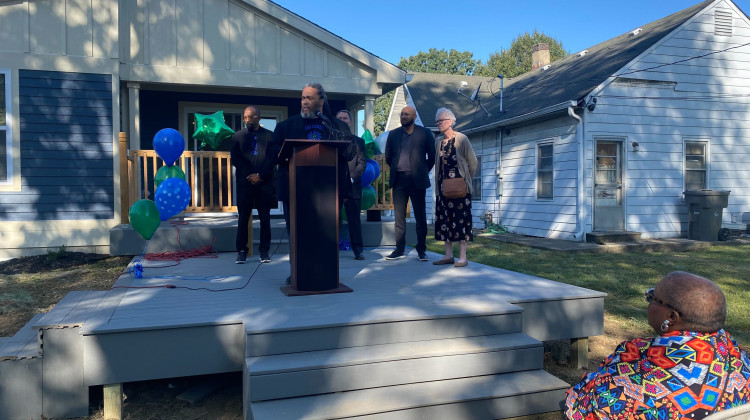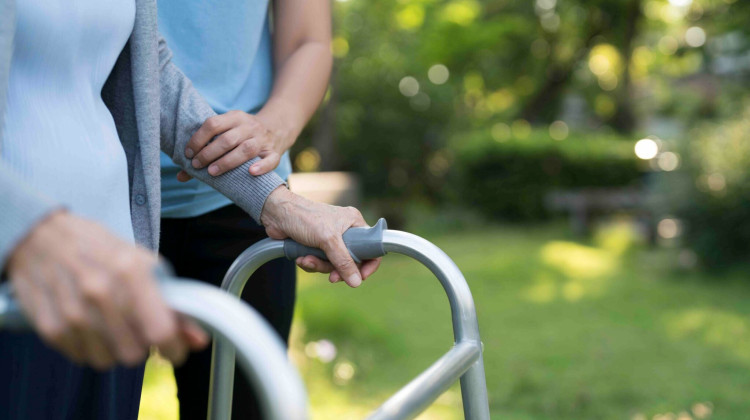
Brandon Cosby, CEO of Flanner House, is excited to support more Black people during their mental health journey.
Elizabeth Gabriel/WFYI NewsA local organization on the near northwest side of Indianapolis recently opened a new mental health clinic called the Morningstar Afrocentric Wellness Center. The goal is to reach people who may otherwise not seek services due to the challenges of finding a therapist of color.
“[Morningstar] is going to be a place that is intentional and unapologetic about serving black and brown faces, with folks who understand brown and Black faces,” said Bwana Clements, director of Morningstar. “I think it's super important that folks are greeted by folks who are culturally competent, trauma informed and understand the common language, the common culture, the common experiences that clients have so they don't have to jump hurdles to get services.”
Mental health services are provided in a house nestled in the community that is roughly 90 percent people of color. West African iconography and symbols are adorned throughout the home as a way to connect people to their African heritage. The clinic is a subsidiary of Flanner House, a local non-profit community center for Black residents.
According to Brandon Cosby, CEO of Flanner House, the mental health program started as a way to meet the needs of the participants in the organization’s Skills to Success Job-Readiness and F.E.E.D programs. Now the initiative has grown to serve community members across the city. Flanner House quickly realized they wouldn’t be able to help someone get a job if they didn’t address peoples’ mental health.
People of color, especially Black residents, have historically been mistreated by medical professionals. That’s one of the reasons why Black people actively avoid counseling and therapeutic spaces.
Even if someone decides to seek mental health services, it can be difficult to find a therapist of color who can relate to them. African Americans make up 13.6 percent of the United States population. Yet, only 4 percent of therapists are Black, according to a 2015 survey by the American Psychological Association. Some people have had to defend Black culture during therapy sessions with non-Black therapists, adding another barrier for seeking services.
“You're literally talking [a] needle in a haystack of finding a person of color to be a therapist,” Clements said. “Where you can walk in at hello and not have to do the mental gymnastics of explaining how you operate. Your motivations, the things that go unspoken in your home or in your relationship or in the community.”
Now Flanner House staff, as well as multiple community members, hope the new clinic will provide a safe pathway for receiving mental health services.
“The City of Indianapolis recognizes the fundamental responsibility we have in restoring basic amenities where they have disappeared in our neighborhoods,” said Indianapolis Mayor Joe Hogsett. “That most certainly includes access to mental health care — mental health care that is affordable and culturally responsible. I'm happy to welcome this critical resource to the Flanner family.”
Working with hair stylists to connect people with mental health services
Flanner House was also a recipient of an $85,000 social innovation grant from the United Way of Central Indiana last year. The money has helped fund a multi-tiered approach that aims to bridge the gap between potential clients and practitioners. The organization, in partnership with a mental health program with Eskenazi Health, has worked with at least nine barbers and stylists who help identify people who need mental health services.
Barbers and stylists participate in a two-day training and receive a certificate from Eskenazi. Then the beauticians provide referrals to Morningstar. The idea is if someone can trust a stylist to cut someones’ hair, or crown, they can trust them to connect them with a mental health provider who will provide a welcoming and culturally inclusive experience.
“Being able able to have [barbers and hair stylists] equipped with being able to identify what are those leading indicators, that we're really seeing something that's just beyond somebody having a typical bad day, and being able to say, ‘Listen, we have a way of being able to connect you with people, and because [you’re going] through me, you're not walking into a foreign space,” Cosby said.
Clements said he will soon train a cohort of funeral directors so they are trained to help people who are in crisis direct them toward mental health services. Cosby and Clements hope to build more Morningstar locations around the city.
Contact WFYI’s health reporter Elizabeth Gabriel at egabriel@wfyi.org
 DONATE
DONATE






 Support WFYI. We can't do it without you.
Support WFYI. We can't do it without you.